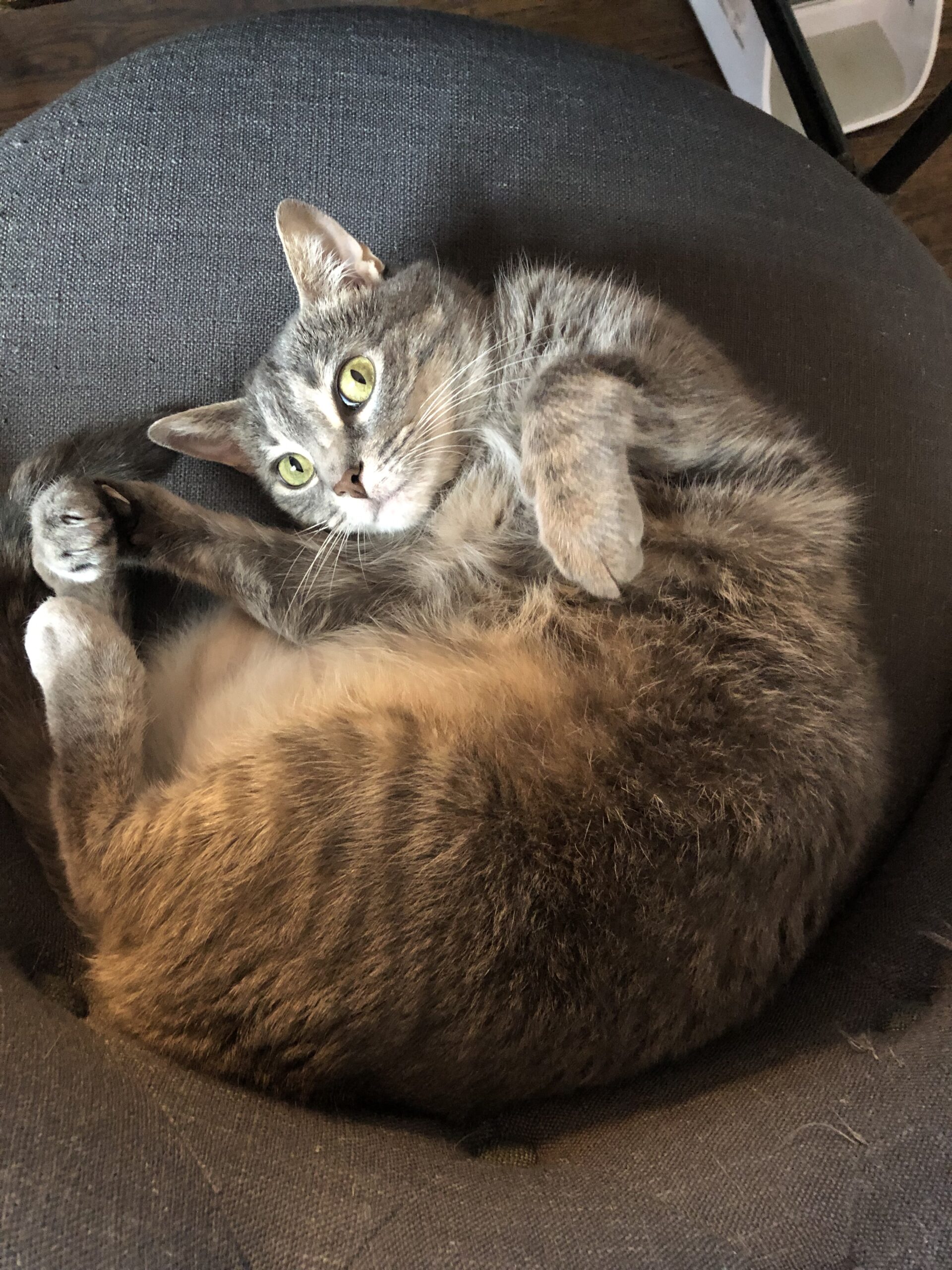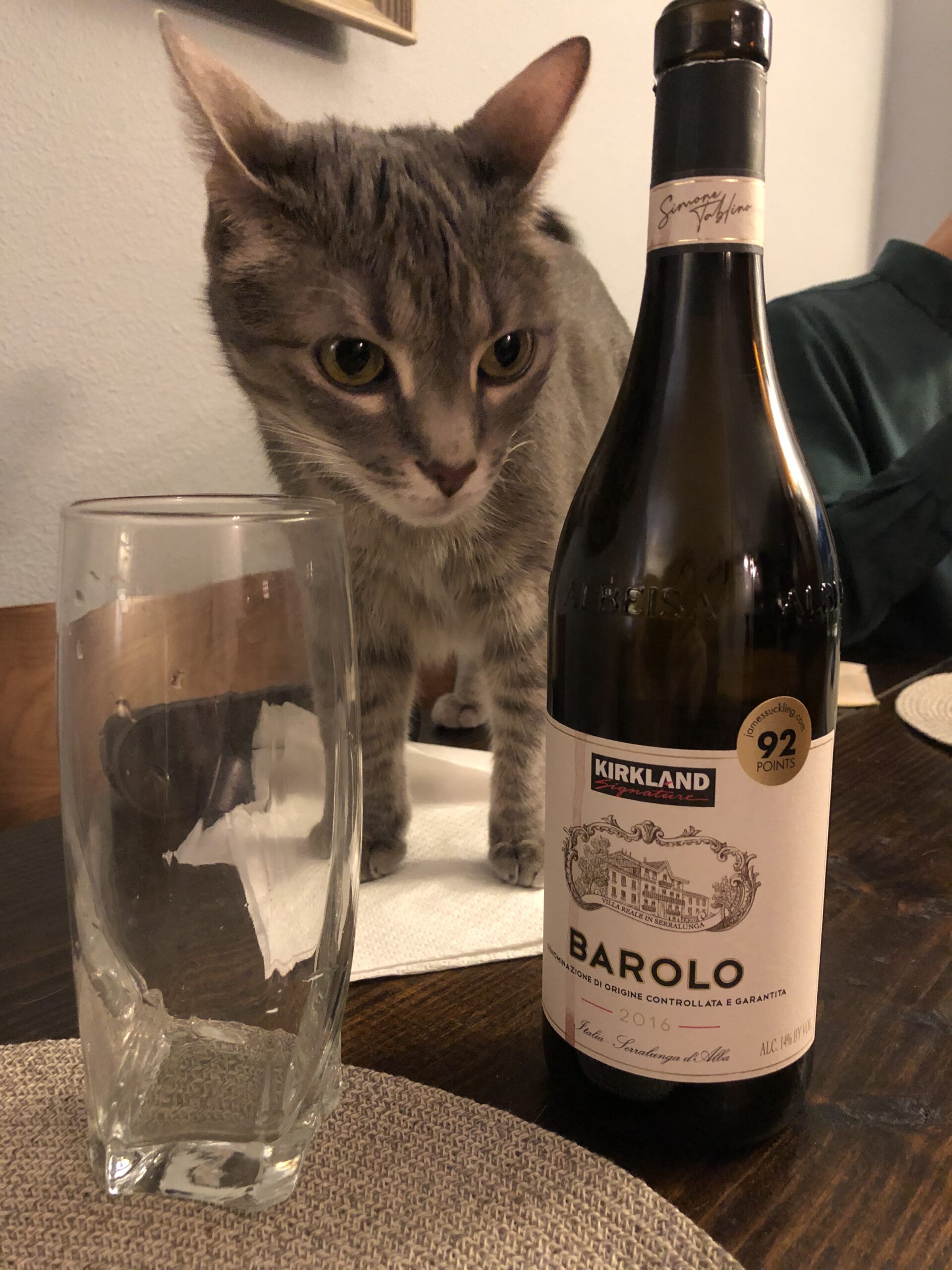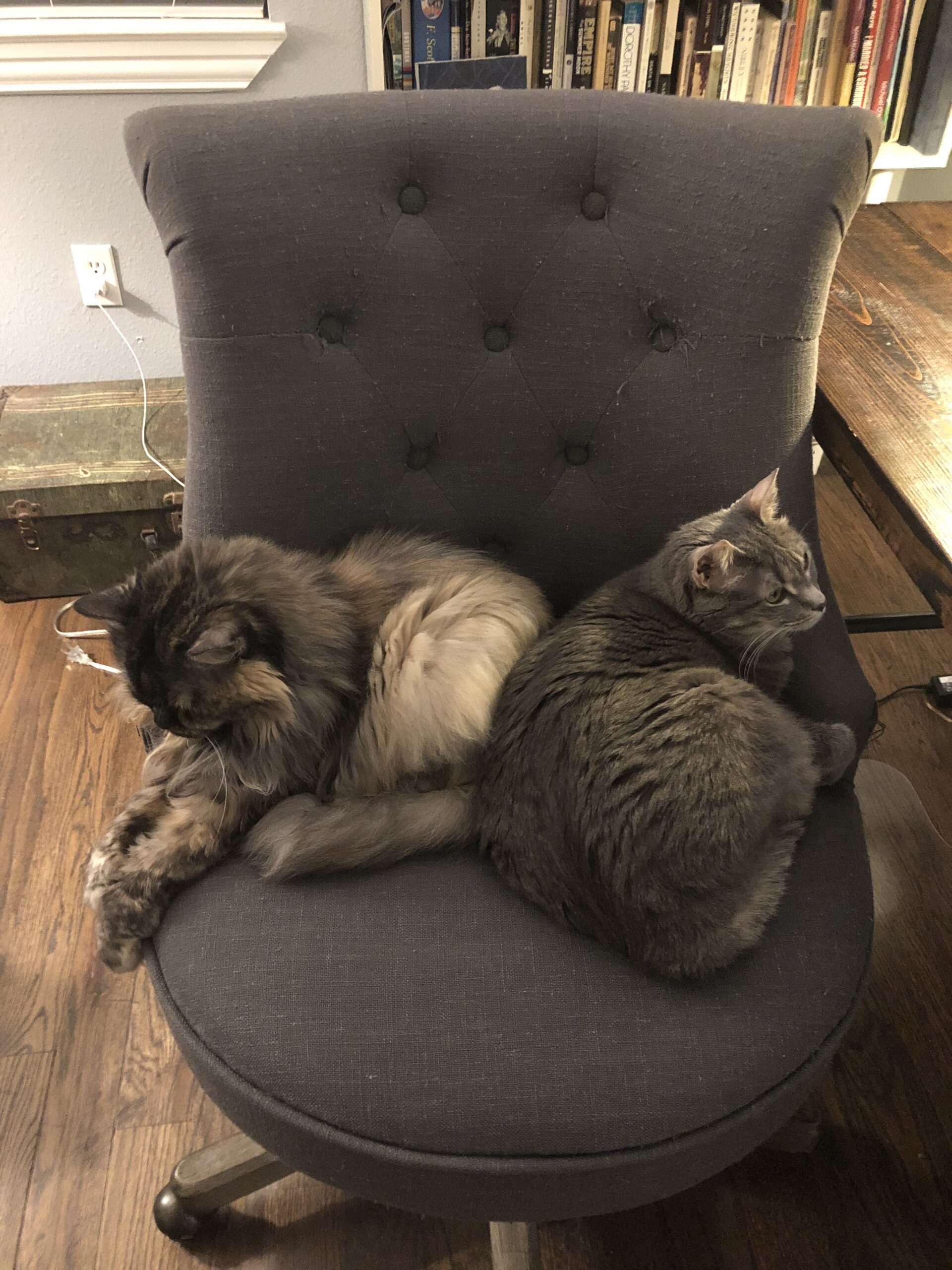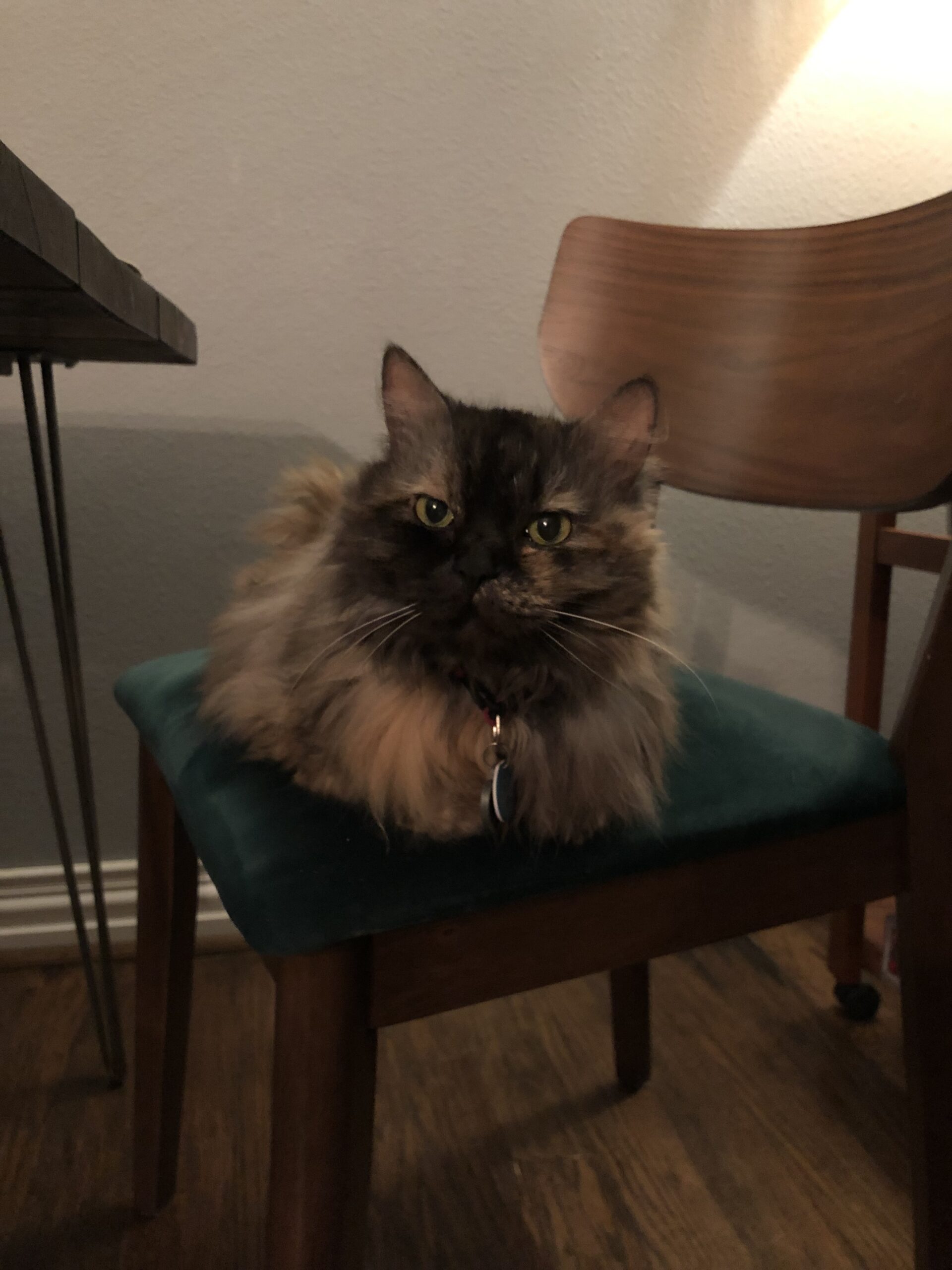Tara and her husband Rob live in Texas where he’s a high school teacher and she’s an editor with a publishing company. They are happily child-free and cat-full by choice and own their condo. While Rob enjoys teaching, he anticipates needing to make a career change at some point due to the stressors of being in the classroom. Tara likes her job, despite her somewhat stagnant income. The couple isn’t sure if FIRE is their goal or just more flexibility around Rob’s job. They’ve asked for our help with their investment strategy as well as tips for successfully living a frugal lifestyle for the long-term.
What’s a Reader Case Study?
Case Studies address financial and life dilemmas that readers of Frugalwoods send in requesting advice. Then, we (that’d be me and YOU, dear reader) read through their situation and provide advice, encouragement, insight and feedback in the comments section.
For an example, check out the last case study. Case Studies are updated by participants (at the end of the post) several months after the Case is featured. Visit this page for links to all updated Case Studies.
The Goal Of Reader Case Studies
Reader Case Studies highlight a diverse range of financial situations, ages, ethnicities, locations, goals, careers, incomes, family compositions and more!
The Case Study series began in 2016 and, to date, there’ve been 83 Case Studies. I’ve featured folks with annual incomes ranging from $17k to $200k+ and net worths ranging from -$300k to $2.9M+.
I’ve featured single, married, partnered, divorced, child-filled and child-free households. I’ve featured gay, straight, queer, bisexual and polyamorous people. I’ve featured women, non-binary folks and men. I’ve featured transgender and cisgender people. I’ve had cat people and dog people. I’ve featured folks from the US, Australia, Canada, England, South Africa, Spain, Finland, Germany and France. I’ve featured people with PhDs and people with high school diplomas. I’ve featured people in their early 20’s and people in their late 60’s. I’ve featured folks who live on farms and folks who live in New York City.
The goal is diversity and only YOU can help me achieve that by emailing me your story! If you haven’t seen your circumstances reflected in a Case Study, I encourage you to apply to be a Case Study participant by emailing your brief story to me at mrs@frugalwoods.com.
Reader Case Study Guidelines
I probably don’t need to say the following because you folks are the kindest, most polite commenters on the internet, but please note that Frugalwoods is a judgement-free zone where we endeavor to help one another, not condemn.
There’s no room for rudeness here. The goal is to create a supportive environment where we all acknowledge we’re human, we’re flawed, but we choose to be here together, workshopping our money and our lives with positive, proactive suggestions and ideas.
A disclaimer that I am not a trained financial professional and I encourage people not to make serious financial decisions based solely on what one person on the internet advises.
I encourage everyone to do their own research to determine the best course of action for their finances. I am not a financial advisor and I am not your financial advisor.
With that I’ll let Tara, today’s Case Study subject, take it from here!
Tara’s Story
Hello! My name is Tara. I’m 34 and married to Rob, who is 35. We are childless by choice, but adore our three cats. We live in a large city in Texas where I work in publishing and Rob works as a teacher. We got married nine years ago and have lived in the same city since. We rented for a few years after marriage and bought a two-bedroom condo in 2017.
What feels most pressing right now? What brings you to submit a Case Study?
We’re interested in creating a sound financial strategy that allows us to have options for our future. More specifically, we like the idea of reaching financial independence within the next 10 to 15 years and are wondering if this is possible or responsible?
We aren’t sure if we’d like to retire early, work part-time, make career changes, or leave jobs when they cease to be fulfilling. For example, teaching takes a toll on Rob and we aren’t sure if it’s a career he can do long-term for the sake of his mental health. Rob is an introvert, and the strains of teaching may not be sustainable for him. We don’t know if our goal of achieving financial independence is a pipe dream for two people on salaries like ours, or if it is realistic. We are both very privileged, but don’t make a ton of money.
We submitted our situation as a Case Study because we have questions ranging from if our current financial setup could allow us to retire early as well as discrete, specific ways we could save more. We are committed savers, and we would like to see how far we can go and what we could be doing differently. We also want to learn how to effectively balance our savings with the ways we want to intentionally spend money, like travel.
What feels most pressing right now is our overall trajectory and if our current behaviors will help us achieve financial independence, and if so, when. Our financial future will help us think through other questions about our career, lifestyle, and how we live our daily lives. It seems pressing that we confirm we are allocating our investments properly. We also lack knowledge about taxes and want to set ourselves up for future financial success.
What’s the best part of your current lifestyle/routine?
The best part of our current routine is the time we spend with each other. We are introverts by nature, so most of our free time consists of exercising, going for walks, eating delicious food Rob cooks, watching movies, playing games, or pursuing our hobbies. I play piano and take lessons from a local teacher. This is an important part of my life, and I consider it financially non-negotiable. Rob paints miniatures for tabletop games, a hobby he started in adolescence and resumed during the pandemic. This has been a great creative outlet for him, and has reduced his work-related stress level. It has also boosted his confidence and self-esteem, especially as he has begun to do minor commission work.
We enjoy our freedom and find great companionship in each other and our pets. We enjoy being child-free by choice, and have no plans to change that lifestyle. We intentionally live quiet lives, and we have created an environment that suits our personalities.
What’s the worst part of your current lifestyle/routine?
The worst part of our current lifestyle is Rob’s stressful and demanding career. Teaching is an essential and noble profession, and many people thrive in the classroom. But it doesn’t suit Rob. He’s quiet, prefers to work alone or in small group settings, and doesn’t respond well to stress. He’s been teaching at the high-school level for seven years. For the first few years, we expected his anxiety to eventually dissipate as he became more acclimated to his work. This hasn’t happened and we both think his current career isn’t sustainable for him over the long-term. Rob’s job has afforded us many advantages and he makes a comfortable living as a teacher. In fact, his wages exceed the median for teachers in our area. In addition, he will retire from teaching with a pension, which is a benefit far too few American workers enjoy. That said, we both think he needs to begin planning for a future outside the classroom.
I love my job and work in an amazing environment with a wonderful boss. I work from home, which gives me the flexibility I need to walk dogs in the neighborhood. This is something I really enjoy doing, both because it helps out friends and neighbors and because it helps me make a little extra money.
The one complaint I have about my current work situation relates to my income. My wages have stagnated and likely will not increase in the near future. This isn’t an issue with my job specifically; it is a fact of life in the wider publishing industry. I earn a comfortable income, but it is disheartening to know that the only thing that would allow me to increase my salary is a radical career change. Despite that, I’d hate to leave a job that serves me well and that I enjoy doing. Overall, I love my work and the lifestyle it allows me to have.
Where Tara and Rob Want To Be in Ten Years:
Finances:
- Close to financial independence. We aren’t sure if we want to go full FIRE, but we certainly want to have options.
- We hope to still be on the savings trajectory we are currently on.
Lifestyle:
- We don’t see any reason to change our lifestyle and routine. We don’t want to purchase a single-family home and we don’t plan on moving. We are comfortable in our current condo, and like the peace of mind that homeownership brings.
- The condo lifestyle is perfect for us because we don’t have a yard to take care of or the other stresses that come with a house. We also have great neighbors and are in a good spot in the city. We like that our condo could provide a rental income someday if we chose that route.
Career:
- Rob needs a career change. We aren’t sure what that will look like. He’s creative and prefers to work alone, and in a quiet setting. He might do well with working from home.
- If we both worked from home, however, we might need to reconsider our housing situation. I do not plan to make any career changes.
Tara & Rob’s Finances
Income
| Item | Amount | Notes |
| Rob’s net income | $4,801 | Rob’s net salary, minus the following deductions: health and dental insurance, 401k contributions, and taxes. |
| Tara’s net income | $3,467 | Tara’s net salary, minus the following deductions: health and dental insurance, 15% 401k contributions, and taxes. |
| Tara’s additional net income from dog walking | $200 | |
| Rob’s annual AP grading income | $125 | |
| Rob’s Teacher’s Pay Teachers net income | $58 | |
| Monthly subtotal: | $8,652 | |
| Annual total: | $103,824 |
Mortgage Details
| Item | Outstanding loan balance | Interest Rate | Loan Period and Terms | Equity (amount you’ve paid off) | Purchase price and year |
| Mortgage on primary residence | $153,696 | 3.00% | 30-year fixed-rate mortgage | $49,804 | $203,500 purchased in 2017 (refi in 2020 for lower interest rate) |
Debts: $0
Assets
| Item | Amount | Notes | Interest/Type of securities held/Stock ticker | Name of bank/brokerage | Expense Ratio |
| Taxable Investments | $219,287.94 | We didn’t know quite what to do when we started investing, so we started a Vanguard account with all of these different allocations. We haven’t contributed to anything other than the Total Stock Market ETF in awhile because we realized it was redundant. Should we consolidate these into the Total Stock Market ETF or let them ride? | Vanguard Total Stock Market ETF: $156,644.69 Vanguard Total Bond Market ETF: $20,494.25 Vanguard Mid-Cap Growth Fund: $12,357.55 Vanguard 500 Index Fund Admiral Shares: $8,114.27 Vanguard Health Care Fund Investor Shares: $8,142.69 Vanguard Growth Index Fund Admiral Shares: $6,923.28 Vanguard Equity Income Fund Investor Shares: $6,611.21 |
Vanguard | Vanguard Equity Income Investor CL: 0.28% Vanguard 500 Index Admiral CL: 0.04% Vanguard Healthcare Investor CL: 0.30% Vanguard Growth Index Admiral CL: 0.05% Vanguard Mid Cap Growth Investor CL: 0.33%Vanguard Total Bond Market ETF: 0.03% Vanguard Total Stock Market ETF: 0.03% |
| Tara’s 401k | $97,773.21 | This is Tara’s Roth 401k. The fees seem high, but I feel stuck since it’s an employer-sponsored account with a match. | Vanguard Target Retirement 2050 Fund | Vanguard | 0.08% |
| Rob’s Roth IRA | $46,680.34 | Vanguard Target Retirement 2050 Fund | Vanguard | 0.08% | |
| Savings Account | $19,746.62 | This is our more robust emergency and vacation fund in a high yield savings account. | 0.55% interest rate | Barclays | N/A |
| Savings Account | $552.56 | This is our emergency fund. We keep a minimum of $500 in here to avoid a charge. | Earns essentially 0% interest | Bank of America | N/A |
| Total: | $384,040.67 |
Vehicles
| Vehicle make, model, year | Valued at | Mileage | Paid off? |
| Toyota Corolla 2012 | $10,753 | 63,000 | Yes |
| Toyota Scion XB 2009 | $5,500 | 55,000 | Yes |
| Total: | $16,253 |
Expenses
| Item | Amount | Notes |
| Mortgage | $1,062.00 | |
| Groceries | $750.00 | Includes household supplies and food |
| HOA fee | $278.96 | Required by our condo community |
| Piano lessons for Tara | $220.00 | |
| Misc. | $200.00 | Clothes (thrifted!), personal items, medical / dental / vision, etc. |
| Average pet vet bills | $150.00 | Rough average of what we spend over a year for vet care for 3 cats |
| Travel budget | $150.00 | Varies by year and depending on the cost of the trips we want to take. |
| Restaurant money | $150.00 | Includes date night and outings with friends |
| Rob’s hobby | $100.00 | |
| Energy bill | $85.00 | |
| Gas | $75.00 | |
| Car insurance for both cars | $63.81 | |
| Cat food for three cats | $60.00 | One of the cats has a special diet |
| Cat inhaler | $55.00 | Yes, our cat has asthma. Who knew that was a thing! |
| Alcohol | $50.00 | Priorities, y’all |
| Household repairs | $50.00 | Very rough estimate of household appliance repairs |
| Car Expenses | $50.00 | Inspections, oil changes, etc. |
| Gifts | $40.00 | |
| Farm Sanctuary donation | $35.00 | |
| Cell phones | $33.55 | Mint Mobile for two phones (affiliate link). Yearly total is $201.23 a person ($402.46 for both of us) |
| Pet Shelter donation | $20.00 | |
| Charity donation | $18.09 | |
| Spotify account | $17.31 | |
| Movie rentals | $15.00 | |
| Amazon Prime membership | $10.00 | |
| PBS streaming membership | $5.00 | |
| Monthly subtotal: | $3,743.72 | I’m not quite sure how to account for the random things in life (the washing machine breaks, the car needs new brakes, we need a new appliance, a pet or person has a major health issue, etc.) But this is a rough estimate! |
| Annual total: | $44,924.64 |
*Note: my employer pays for our internet since I work from home, which is why it’s not listed above.
Credit Card Strategy
| Card Name | Rewards Type? | Bank/card company |
| Amazon Prime Rewards Visa Signature Card | 5% at Amazon and Whole Foods; 2% at Restaurants, Gas Stations, Drugstores;1% all other purchases | Chase Bank |
| Bank of America Visa Signature | 3% online shopping; 2% for groceries; 1% all other purchases | Bank of America |
Tara’s Questions For You:
Our questions fall into two broad themes: discrete investing questions and broader questions about frugality as a lifestyle.
1) Investing?
- Instead of throwing money into our Vanguard Total Market ETF, should I contribute MORE to my company 401k to reach the annual IRS-allowed max?
- I contribute 15% to this right now, which exceeds my employer match requirement. I have a choice about what type of contributions to make and I choose to make Roth contributions.
- Are there any steps we could take to optimize our investment earnings?
- Should we consolidate all of our individual Vanguard accounts into the Total Market Index Fund?
- Should we consider shifting our resources over to Vanguard’s Total Stock Market Index Fund Admiral Shares, for instance?
Background Info:
We have investments in a variety of Vanguard mutual funds, although the vast majority of our investments are concentrated in the Vanguard Total Stock Market Index Fund ETF. We want to know if we should shift our investments entirely into this fund, or if it is okay for us to hold investments in a variety of other funds. They seem fairly superfluous, given the diversification provided by the Vanguard Total Stock Market Index Fund ETF, but they also seem harmless. I do wonder if we are missing opportunities by not wholly committing to the Vanguard Total Stock Market Index Fund ETF. Is it best to have more in one big bucket?
Are there other mutual funds that may be better than the Vanguard Total Stock Market Index Fund ETF? What I like about our current strategy is that we have full control each month over how much money we save. If we have an emergency or need to save for something, we can decrease our investments for that month and use cash flow to pay for whatever we need to. If we turned to a more aggressive strategy with my 401k, we wouldn’t have as much control. However, I think financially we would be fine maxing out my 401k (and Rob’s) and having enough left over to live, save, and invest more in our other account. I also feel strange about going through my employer each time I need to make adjustments. I don’t feel as in control and I don’t like the idea of my employer knowing too much about my financial situation.
We also like the idea that we can access our money better through our current method than if more were stored in our 401k. Though I know that’s the point: not to access it! It’s just peace of mind. What is the best strategy?
I know a core tenet of most financial advice is to steer clear of investing in specific stocks. I know we are supposed to trust index funds when it comes to investing our money. Is there any nuance to that general principle? Should we consider investing in specific stocks with proven track records, in order to potentially boost our earnings? I’ve considered investing in Amazon, Costco, and other stocks. We do not currently hold individual stocks, but I want to know if that is something we might consider doing in the future.
2) Taxes?
We don’t understand taxes at all. We have no idea how taxation is biting into our investments and we would like to plan an intentional strategy for limiting our tax burden when we begin to draw from our accounts. Would maxing out my 401k and investing less in our Vanguard accounts help with taxes? Should we open up another Roth IRA for me? Overall, taxes are something we are pretty much in the dark on.
3) Living a Frugal Lifestyle?
- How do you balance a commitment to frugality with a very human need to get the most out of life?
- Should we be open to spending more on things that could enrich our lives before we reach financial independence (eg. travel, eating out, movies, etc.)?
Background Info:
We were heavily influenced by Liz’s book, Meet the Frugalwoods, and began saving aggressively years ago. We have continued to refine our savings strategies and now save more than 50% of our income annually. Our level of commitment to frugality varies, but we are consistently thrifty people who save aggressively. On the whole, this lifestyle has been great for us.
But we have had some conversations lately about the ways frugality can become a source of anxiety.
Sometimes Rob and I forgo purchases and experiences that could improve our lives because of our concerns about the expenses associated with them. This can be demoralizing, and it causes us to miss out on opportunities that could enrich our lives. For instance, we rarely leave our home for meals, and sometimes wish we could go out on more dinner dates. This is especially important for me, since I work from home. It is also important for Rob, since it would be nice to give him an occasional break from cooking. We also thrift nearly all of our clothing, and sometimes we would both like to buy some new things to spruce up our wardrobes.
Overall, we’ve encountered a dark side to frugality, one that can limit our experiences and life satisfaction. This can take a light toll on our mental health. Non-essential purchases can be fraught with guilt. We tend to forgo things we need and live a life without spontaneity and play.
Liz Frugalwoods’ Recommendations
Tara, Rob and all three cats are in fabulous financial shape! They’ve completed the pre-requisites for a healthy financial life and are in the luxurious position of turning their attention to their investing strategy. Very, very well done!
Wondering what those pre-requisites are? Here you go:
-
Eliminate debt! It’s tough to move forward on financial goals if you’re weighed down by debt. I don’t include a low, fixed-rate mortgage in this definition of debt.
- Save up an emergency fund! This is 3 to 6 months’ worth of your living expenses held in an easily-accessible savings or checking account.
- Track your expenses! In order to know how much you need in your emergency fund, you need to know how much you spend every month. The easiest way to do this is with a free online program, such as the one offered by Personal Capital, which is what I use and recommend (affiliate link).
- Contribute to your retirement account and be on track given your age and planned retirement date! If your employer offers a match, be sure to contribute enough to get the match–this is FREE $$$. If your employer doesn’t offer a retirement plan–or you’re self-employer–you need to set-up an individual retirement plan, such as: an IRA, a Roth IRA, or a Solo 401k (that’s what I have).
- Create a credit card strategy! This is an optional next step if you’ve completed steps #1 -4. Using a credit card responsibly–which means paying it off in full every month–is a fabulous and easy way to earn rewards. I love my cash back card and earned $712.59 from it last year. Here’s how.
- Open a taxable investment account! This is another optional next step if you’ve completed steps #1 -5. Investing in the stock market is one way to have your money make more money. Wondering how to get started? The best primer on investing (in my opinion) is JL Collins’ Simple Path to Wealth (affiliate link).
- Explore other tax-advantaged vehicles! Another optional step if #1-6 are done. Such accounts include (but are not limited to): Donor Advised Funds and 529s.
Before delving into Tara’s specific questions, I want to go through all of their assets.
Review of Tara & Rob’s Assets
Cash:
Tara and Rob have a total of $20,299 between their two savings accounts. This is great, but, I’m not clear on why this is in two different accounts?
- If it were me, I’d consolidate to one high-yield savings account, such as the American Express Personal Savings account, which–as of this writing–earns 1.75% in interest (affiliate link).
- Tara & Rob would earn $355 on their money in a year just by having it in this high-interest account.
They are spot on with this dollar amount as their emergency fund. Their monthly spending is $3,743.72, which means three months’ worth of spending = $11,231.16 and six months = $22,462.32. Perfect job, Tara and Rob!
Retirement:
Between Tara’s employer-sponsored 401k and Rob’s Roth IRA, they have $144,453.55 in retirement investments. Let’s check this against Fidelity’s retirement metric:
Aim to save at least 1x your salary by 30, 3x by 40, 6x by 50, 8x by 60, and 10x by 67.
Since Tara & Rob are 34 and 35, we’ll say 2x their combined income, which would be ($103,824 x 2) = $204,648. This means they’re a bit behind, however…
I have questions about Rob’s employer:
- Do they offer a retirement plan?
- If so, I encourage him to explore the details and find out if there’s an employer match.
- If there’s a match available, he should start contributing to this immediately. Again, an employer match is FREE $$$$.
- Tara mentioned a pension plan for Rob–they should research the details on that.
- Does it require full vesting/a specified number of years of service?
- Is any portion of the pension available if Rob leaves teaching before that service date?
Social Security:
The above retirement total also doesn’t include what they’ll each receive in Social Security. To figure out their anticipated Social Security benefits, Tara and Rob should:
- Follow these instructions on how to retrieve their earnings tables from ssa.gov (the government’s Social Security website).
This information, combined with the answers to my questions about Rob’s pension, will give them a clearer picture of what they can expect to have in retirement.
Tara’s Question #1: Investing Strategies
Alrighty, let’s turn our attention to the meat of today’s study: investments. As I read it, Tara’s investing questions boil down to:
- Should they each max out their retirement accounts? (Tara’s 401k and Rob’s Roth IRA)
- Should they consolidate their taxable investments into their Vanguard Total Stock Market ETF?
- Should they invest in individual stocks?
1) Maxing Out Retirement Accounts?
Some retirement accounts, including Tara’s 401k, are pre-tax. That means you don’t pay taxes on the money you contribute to these accounts. You do pay taxes when you take this money out in retirement; BUT, this generally works in your favor because your tax bracket should be lower in retirement since your income is likely to be lower (assuming you’re no longer working). If Tara and Rob want to decrease their taxable income, maxing out Tara’s 401k–which is $20,500 in 2022–is an easy way to do so. However, Tara is correct that putting money into a 401k locks it up. You can’t withdraw from a 401k until age 59.5; if you do so before then, you’ll pay a penalty. As Tara noted, the whole point of a 401k is that you don’t touch that money!
Rob’s retirement account–a Roth IRA–is taxed in the opposite way from Tara’s 401k. Here’s a quick rundown on Roth vs. traditional IRAs:
Roth IRA (Individual Retirement Account):
- A Roth IRA is a retirement account that’s post taxes.
- This means you pay taxes on the money you put into a Roth IRA, but you don’t pay taxes when you withdraw the money in retirement.
- A Roth IRA grows tax free.
- You need to be age 59.5 before you can withdraw money penalty-free (although there are exceptions).
- Your eligibility to contribute to a Roth IRA depends on your income and your particular tax situation.
- I like this Nerd Wallet article on Roth IRAs if you want to read more.
Traditional IRA (Individual Retirement Arrangement):
- A traditional IRA is a retirement account that’s pre-tax.
- This means you don’t pay taxes on money you put into an IRA, but you do pay taxes when you withdraw the money in retirement.
- There are no income limits. Anyone can contribute to a traditional IRA.
- You need to be age 59.5 before you can withdraw money penalty-free (although there are exceptions).
- More about traditional IRAs here.
The bottom line is that contributing to some sort of tax-advantaged retirement account (such as a 401k, 403b, IRA, SEP IRA, etc) makes sense for most people in most circumstances.
How much you can contribute to a Roth IRA (and whether or not you are allowed to) depends upon how you file your taxes and your MAGI (modified adjusted gross income). The IRS has this handy chart outlining Roth IRA options. Assuming Tara and Rob are “married filing jointly” and their MAGI is under $204k, the maximum allowable contribution for each of them is $6,000/year.
If he wanted, Rob could also open a traditional IRA, which would be a pre-tax account (and thus, would both reduce their taxable income and increase his retirement savings). However, that $6k IRS-mandated limit is still in effect and your COMBINED contributions to both a Roth and a traditional IRA can’t exceed $6k.
Tara could also open a traditional IRA and contribute $6k annually. This is another option for further reducing their taxable income, if that’s a priority for them.
However: before making any decisions about IRAs, I’d first want to know what options Rob has through this employer.
2) Consolidating the Taxable Investments?
Now we’ll turn our attention to Tara and Rob’s other stock market investments–their taxable investments. Retirement accounts (like 401ks and IRAs) are ALSO invested in the stock market, but are taxed differently than plain old taxable investments. With taxable investments, there are no age, income, or contribution limits, and don’t receive any preferential tax treatment. Hence, their name: “taxable investments.”
If everything I just said sounded completely incomprehensible–but you’re curious–I HIGHLY recommend you check out the book The Simple Path to Wealth by JL Collins (affiliate link). If you’re still with me, let’s forge on…
Tara’s question about whether or not to consolidate their various Vanguard accounts into their Total Market Index fund comes down to capital gains taxes. You have to pay capital gains taxes on the profits (not the total amount) your stocks have earned over the years.
What you pay in capital gains taxes depends on several factors:
- How long you’ve had your investments:
- Short-term capital gains taxes–when you’ve held stocks for less than one year–are higher than long-term capital gains taxes, which is yet another reason to keep taxable investment accounts open for the long-term.
- How much money your investments have made since you bought them:
- In other words, how much these investments have appreciated since you purchased them.
- Your income.
For more on capital gains taxes, check out this Motley Fool article.
To figure out their capital gains exposure, Tara and Rob should look at their Vanguard portfolio for their “cost basis,” which is what they bought the shares for. From this, they can calculate their potential capital gains.
If Tara and Rob find that they’d pay nominal capital gains to sell their shares and move them into the Total Market Index Fund, then I personally would consolidate. If it were me, I would put everything into one total market, low-fee index fund that matched my asset allocation needs and risk tolerance. The reason is that, in general, investing in a total market index fund gives you the broadest possible exposure to the stock market (as well as the lowest fees).
In a total market index fund, you’re essentially invested in a teensy bit of every single company in the stock market, which gives you a ton of diversity. If one company–or even one sector–tanks, your entire portfolio isn’t toast. It’s the “not putting all of your eggs in one basket” version of investing. It’s what I do, it’s what the vast majority of FIRE folks do and, best of all, it’s very, very easy to implement and maintain.
Going forward, if it were me, I would focus on funneling all my extra money into the Total Market Index Fund. Tara and Rob also have Vanguard’s Total Bond ETF, which is something a lot of folks like to invest in because bonds are a lower-risk (although also lower-reward) investment vehicle.
Is it Wise to Invest in Individual Stocks?
In my opinion, absolutely not. Why? because if that one company goes down, your investment plummets. If Apple or Amazon or Netflix or whoever has a bad quarter, you have a bad quarter. If you are instead invested across the entire stock market, companies can go bankrupt and your portfolio will still bob along with the broader stock market. Investing in an individual stock is “putting all of your eggs in one basket.”
I consider investing in individual stocks to be a hobby, not a financial strategy. If you really enjoy day trading and want to do it for fun, go right ahead! But I wouldn’t do it with money I need. In my opinion, it’s not much safer than going to a casino.
Expense Ratios
I also want to note the expense ratios on Tara and Rob’s investments. Expense ratios are what you pay your brokerage (in this case, Vanguard) for the ability to invest in the market. Tara and Rob did a fantastic job selecting a brokerage with excellent low-fee funds.
Tara is correct that the expense ratios are a tad higher on some of their accounts, but none of them are outrageous. In general, you want to aim for the lowest possible fees because there’s no reason not to.
For reference, the following three brokerages offer DIY low-fee investment options:
- Fidelity’s Total Market Index Fund (FSKAX) has an expense ratio of 0.015%
- Charles Schwab’s Total Market Index Fund (SWTSX) has an expense ratio of 0.03%
- Vanguard’s Total Market Index Fund (VTSAX) has an expense ratio of 0.04%
Wondering how to find a fund’s expense ratio? Check out the tutorial in this Case Study.
Tara’s Question #2: Taxes
Any tax decision will depend on Tara and Rob’s gross annual income. In general, if you work in the US, have a W2 income, and aren’t a billionaire, there aren’t really all that many tax-advantaged options available to you. You can–and should–take advantage of what’s available. But, for the vast majority of people–and especially if you’re taking the standard deduction–there’s no “one weird trick” to saving money on taxes. It gets more sophisticated if you are FIRE’d (or in the tax year prior to FIRE), which I’ve addressed in previous Case Studies.
Here are the standard tax-advantaged vehicles Tara and Rob can look into:
- Retirement accounts, such as 401ks and IRAs: I outlined these tax advantages above.
- HSAs (Health Savings Accounts): “A type of savings account that lets you set aside money on a pre-tax basis to pay for qualified medical expenses” (source: healthcare.gov).
- FSAs (Flexible Savings Accounts): “…a special account you put money into that you use to pay for certain out-of-pocket health care costs. You don’t pay taxes on this money. This means you’ll save an amount equal to the taxes you would have paid on the money you set aside” (source: healthcare.gov).
Here are a few others that don’t apply to Tara and Rob, but could be helpful to other readers:
Tara’s Question #3: Living a Frugal Lifestyle?
I don’t want anyone to think I espouse depriving oneself in favor of saving money! I know it’s a tough needle to thread, but my hope is that folks can find their sweet spot of “luxurious frugality” where all their needs are met, they’re able to afford some “wants,” and they’re financially on track for their future. At the end of the day, life’s too short to spend it doing stuff you hate and that’s where I think frugality comes in: it gives you the option to live a life you love.
The whole point of frugality is to save on things that don’t matter to you so that you can spend on the things that matter the most.
This is values-based spending and it’s how I structure my spending decisions. Am I spending on things that support my highest and best priorities? If yes, great! If not, then it’s time for a re-adjustment.
I’ve written about this topic quite a bit over the years, so I’ll refer Tara and Rob to some of these oldies-but-goodies from the Frugalwoods archives:
From 2017:
Geez louise, evidently I was on a tear in 2017…
From 2016:
From 2015:
I hope these offer some insight into how I maintain frugality without feeling the undertow of deprivation.
Goal Clarity
I also wonder if some of their financial stress stems from the uncertainty around Rob’s career? I sense that this weighs on both of them since it seems clear Rob wants to transition to a new job. I wonder if they might feel more comfortable with their discretionary spending once they’re clear on Rob’s next step and new salary?
To that end, I encourage Rob to begin actively job searching. We’re currently in a fantastic job market for employees and Rob should capitalize on that! I imagine there are plenty of non-classroom-teacher careers accessible to someone with his experience, such as: curriculum development, textbook creation, consulting, etc? Former teachers, please share your advice in the comment section!
Frugality Should Not = Anxiety
I was sad to read Tara’s comment that, “…we have had some conversations lately about the ways frugality can become a source of anxiety.”
Tara, you and Rob have no reason to feel anxiety around your finances. You’re in great shape and you’ve put yourself in the position of NOT needing to feel anxious about money. Through your wise choices, you and Rob have given yourselves that gift. Time to start enjoying it! This doesn’t mean blowing money on stuff you don’t need, but it does mean building conscious treats into your lifestyle on the regular.
Tara mentioned a desire to eat out and that’s something they should absolutely do! Do it tonight! I’ll make the reservation for you if you want.
Perhaps establish a schedule for dining out–weekly, bi-weekly, monthly–then go to the restaurant and have a wonderful time knowing that you’ve planned, prioritized and saved to make it possible. Understand that this is very different from defaulting to take-out every night because you failed to meal plan. This is strategic luxury and it’s how frugality remains tenable for a lifetime. My husband and I eat out regularly and every single time, it’s a delightful experience. We don’t stress about the cost because it’s a planned expense. You can build restaurant meals into your budget in exactly the same way you include groceries, HOA fees, etc.
Here’s how to be strategically luxurious:
- Identify your priorities
- Spend on those
- Eliminate spending on non-priorities
There’s honestly little point in being uber frugal if you’re not using some of your savings for the things you enjoy most in life. Optimizing every last expense, but being miserable, defeats the longterm goal of financial stability. Why have money saved up if you can’t ever enjoy it?
Summary:
- Make a reservation at a restaurant, enjoy your date night, feel zero guilt, and commit to doing it regularly! Let me know if you need me to make the reservation for you.
- Find ways to incorporate fun and spontaneity into your ultra-frugal budget. Create a plan, set aside funds, and feel confident that you’ve worked hard to make this fun possible.
- Consider consolidating your cash accounts into one high-interest savings account.
- Research the retirement options and pension offered by Rob’s employer.
- Rob should begin an active job search, especially in light of the current red hot job market.
- Determine your capital gains tax burden and decide if it’s worth consolidating all taxable investments into the Vanguard Total Market ETF. Going forward, plan to focus contributions towards this account.
- Determine your combined gross income and then consider if you want to explore additional tax-advantaged strategies, such as:
- Maxing out Tara’s 401k
- Opening an IRA (for Tara, for Rob or both, being cognizant of the $6k limit)
- Researching HSAs and FSAs. I’d start with seeing what your employers offer.
- Cuddle up with the cats and pat yourselves on the backs–you’re doing great!
Ok Frugalwoods nation, what advice do you have for Tara? We’ll both reply to comments, so please feel free to ask questions!
Would you like your own case study to appear here on Frugalwoods? Email me (mrs@frugalwoods.com) your brief story and we’ll talk.
Never Miss A Story
Sign up to get new Frugalwoods stories in your email inbox.



















